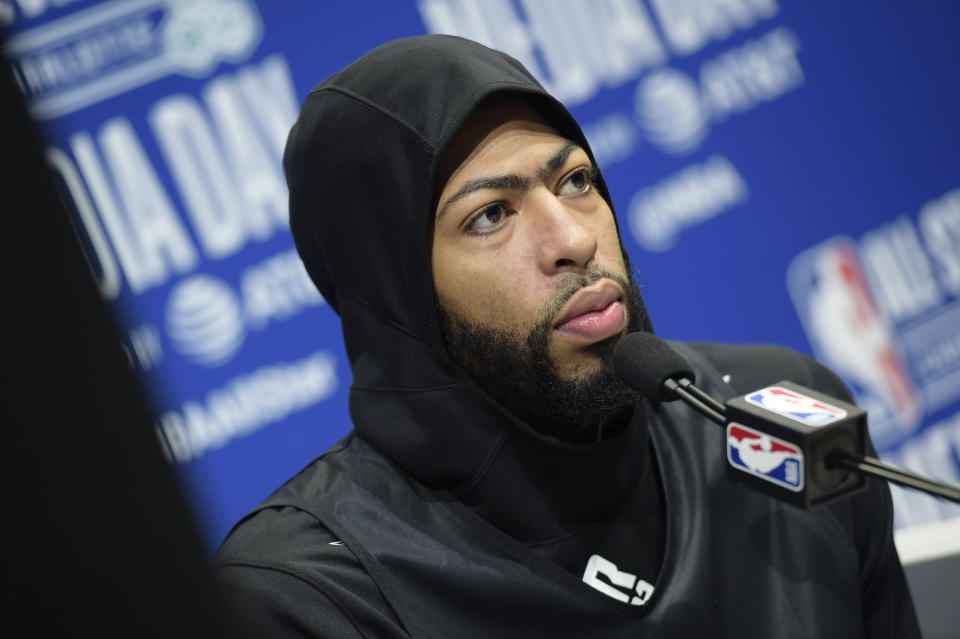Why Adam Silver doesn't mind Anthony Davis trying to escape New Orleans' constant mediocrity
It turns out freedom isn’t free. Just ask the New Orleans Pelicans. Or NBA commissioner Adam Silver, who spent his press conference before All-Star Saturday Night addressing the flurry of drama, trade demands and tampering probes that has ruled the dialogue of a league that, nominally, has never been healthier.
The ever-evolving soap opera that is the Los Angeles Lakers’ wicked pursuit of Anthony Davis has cast New Orleans — the NBA’s smallest market — as the feeble prey of big, bad Lakers exceptionalism. So there Silver was, trying to explain a problem when he should have been basking in the solution: Davis requested a trade from the Pelicans, one of the league’s most poorly run franchises, because he wants to win. That’s meritocracy at work.
Silver seems to understand as much. He didn’t seem interested in restricting freedom or doing the bidding for small-market teams. On investigating tampering, he said the league is doing “a terrific job,” which is pretty laughable. He reminded reporters that trade demands are part of the ancient machinery of the NBA, only decrying the fact that leaks create public spectacles. The system isn’t perfectly meritocratic — people like big cities and good weather, after all — but he distinguished market size from revenue generation as a bigger factor in creating more “parity of opportunity,” a systemic issue he seems intent on addressing in the next CBA.

When asked about Davis requesting a trade a whole 18 months before his contract ends with the Pelicans, Silver looked in the mirror, referencing a provision in the last CBA that allows a team to extend a player’s contract the summer before his final year, thereby opening negotiations — and some awkward conversations — a year early. “The law of unintended consequences. It hasn’t worked as perfectly as we planned,” he said. But if it was intended to give teams a heads-up — if a club knows a star player doesn’t want to sign an extension, it could trade him — it’s worked.
The San Antonio Spurs got an All-Star in DeMar DeRozan and young assets in exchange for Kawhi Leonard. The Indiana Pacers got better when they traded Paul George to the Oklahoma City Thunder for Victor Oladipo and Domantas Sabonis. The Chicago Bulls and Minnesota Timberwolves both got a return on trading Jimmy Butler. It only became a problem when Butler, not his organization, was the one who wanted to break up. The Pelicans, when they part ways with Davis, will also get a haul in return.
Players, in the end, will find a way to do what they want to do. Davis will play elsewhere, whether it’s next October or the October after. The divorce hasn’t been pretty, but the alternative of him walking away for nothing is much worse. The team he is leaving has never had more tools to bounce back, between aggressive revenue sharing and a notice of departure that came 18 months early.
The NBA’s new world order has been relatively friendly to small-market teams. The Milwaukee Bucks lead the East. The Denver Nuggets are No. 2 in the West. The Thunder and Pacers exchanged stars and found better fits. The Memphis Grizzlies went to the playoffs seven years in a row before finally aging out last year. Six of the NBA’s eight smallest markets would make the playoffs if they started today. The Sacramento Kings could sneak in, too, at the expense of — wait for it — the Lakers, who are currently on the outside looking in, alongside their big-market buddies in New York and Chicago.
Two CBA’s ago, Silver added, the league shortened player contracts to “more closely tie pay to performance, give teams a chance to rebuild faster, and we also wanted to give players the flexibility to move on.”
It was also intended to give New Orleans — like every other team — a lot of shots to get it right. And the Pelicans took them.
Since adding Davis, the Pelicans have traded for (among others) Ryan Anderson, Robin Lopez, Tyreke Evans, Jrue Holiday, Omer Asik, Quincy Pondexter, Norris Cole, Omri Casspi, DeMarcus Cousins and Nikola Mirotic.
In seven years, they drafted a total of three first-round picks. Nerlens Noel, the No. 6 pick in 2013, never played a game for the Pelicans before being packaged for Holiday. In 2015, they attached a first-round pick to Austin Rivers, drafted alongside Davis in 2012, in exchange for … Quincy Pondexter. Buddy Hield, drafted at No. 6 in 2016, played a whopping 57 games in a Pelicans uniform when he was traded for Cousins.
“The latest I’ve heard from our basketball operations group is that 40 percent of our players are going to be free agents this summer,” Silver continued. “Some people could say, ‘Oh my God, look at all that player movement.’ On the other hand, that player movement could be very positive for a lot of teams.”
It just hasn’t been positive for New Orleans. The NBA isn’t a perfect meritocracy, but it does well enough to suss out mediocrity.
More from Yahoo Sports:
• Kaepernick’s lawyer predicts ‘one of 3 teams’ picks up QB
• Goodwill: What happened to Giannis’ ASG MVP?
• Team LeBron wins wild NBA All-Star shootout
• Iole: Velasquez’s UFC return spoiled in 26 seconds

 Yahoo Sports
Yahoo Sports 